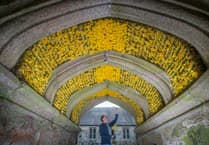A leading local conservation charity is calling on people to help it discover more about local bats.
Among the host centres where people can borrow a bat detector are The Tamar Valley Centre in Gunnislake and Becky Falls, Manaton, Dartmoor.
Devon Wildlife Trust is about to embark on the ninth year of its Devon Bat Survey. The research is believed to be one of the biggest citizen science projects in the county and has already collected more than 1.3-million bat records. Data from the surveys play a vital role in helping to protect bats.
The 2024 Devon Bat Survey opened yesterday (May 7) and Devon Wildlife Trust is hoping to recruit volunteer ‘bat detectives’ to take part. No previous experience of bat detecting is necessary. Instead, participants need to agree to host a small electronic bat detector in their garden for three consecutive nights. The bat detectors then record the ultrasonic signals made by bats as they navigate the dark during their nighttime flights.
Devon Wildlife Trust’s Lindsay Mahon coordinates the bat survey as part of her work for Saving Devon’s Treescapes project.

Lindsay said: “Last year our wonderful volunteer bat detectives recorded more than 350,000 bat passes – that is, records of bats flying by. Many of these were common kinds of bat such as pipistrelles, but the surveys also turned up several rarities including threatened greater horseshoe bats.
“The results of the bat survey provide us with an invaluable insight into the habits of these fascinating animals. We use its results to help direct our work to where it’s needed most – protecting the homes and feeding grounds of Devon’s bat populations.”
This year’s Devon Bat Survey will run until early October, coinciding with the months when bats are most active. Participants book the dates on which they want to undertake their survey and then arrange to pick up their bat detector from one of 12 host centres dotted around the county (see full list below). After three nights of recording, they return their bat detector and upload their survey recordings to an online system which analyses the sounds and returns the results showing which types of bats were detected.
DWT’s bat survey coordinator, Lindsay Mahon said: “We encourage people of all ages, in all parts of the county, to join in and take part in the Devon Bat Survey. All we ask is that you place your detector in a secure location, such as a private garden, follow the instructions we provide, and then enjoy your results. My top tip is to sign up early to take part as bookings fill up fast.”
More information about the Devon Bat Survey is available at www.devonwildlifetrust.org/devon-bat-survey-2024

